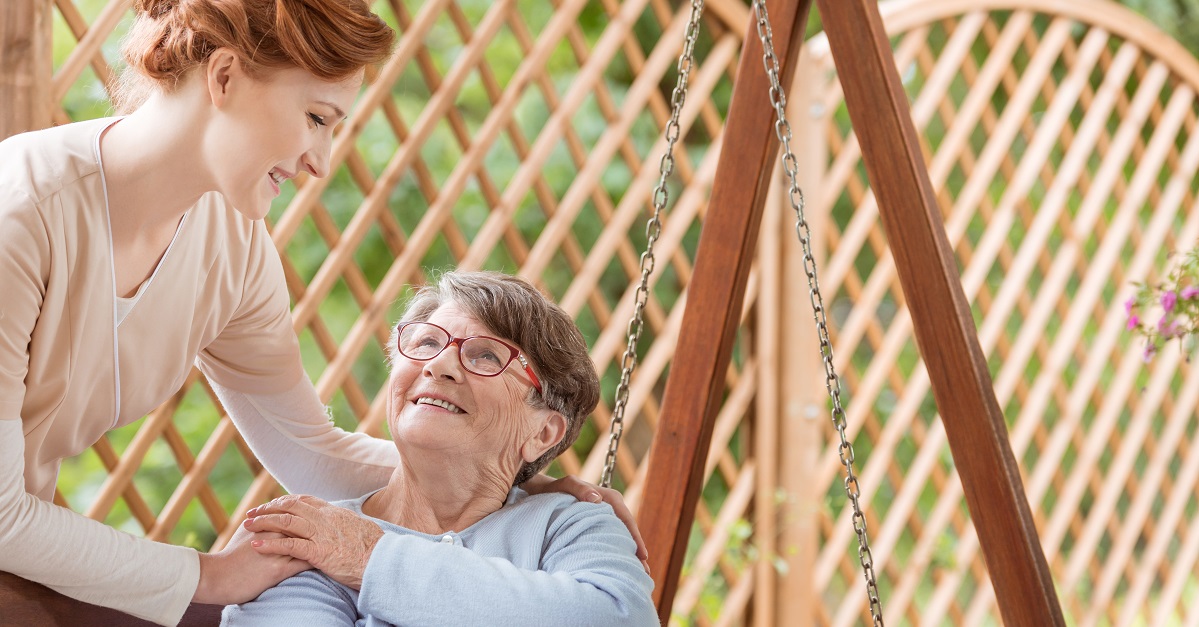Throughout life, we get used to having friends and family around, which makes it easy to take companionship for granted. Many lose touch with loved ones as they age, some may pass away, and it can become difficult to communicate with friends and family in the digital era. As a result, elderly individuals often become isolated.
According to a survey by the University of Michigan Institute for Healthcare Policy and & Innovation, about a quarter of older adults are socially isolated at least part of the time. A third say they don’t have any regular companionship. Additionally, loneliness and self-isolation is more common among those with health issues or an unhealthy lifestyle.
At Alliance Homecare, we believe in the importance of companionship for elderly individuals. Social interaction provides more than just emotional benefits. It’s a vital component of holistic health, so regular companionship is an important part of the home nurse care services we offer.
Keep reading to learn why companionship matters for aging adults, the role social engagement plays in overall health, and the benefits of home care you can expect to see from at-home companion care.
Elderly Companionship: Why It Matters
As a society, we’ve come to accept that loneliness is a natural or inevitable part of aging, like going gray or getting wrinkles. Unfortunately, social isolation is common among elderly adults, but that doesn’t mean it’s normal.
There’s a reason people strive to make friends, find life partners, grow families, and build communities. The need for human interaction and emotional support can’t be understated, and it doesn’t suddenly disappear with age.
Of course, some people prefer to live a life of solitude, but this is the exception, not the rule. Additionally, if an elderly individual doesn’t blatantly express their loneliness, that doesn’t mean they’re happier being alone.
Ongoing lack of companionship can pose health concerns for seniors. Isolated individuals have a higher risk of depression and tend to feel uninspired to live healthfully or develop positive routines. Without someone to talk to, many elderly adults don’t seek help for various health concerns, and it may take them longer to get emergency assistance for a stroke, heart attack, or a fall.
Companionship can go a long way and help make life worth living. Even as things slow down with age, talking and interacting with people who care provides elderly adults with a sense of meaning, and ultimately, a happier outlook.
Why Social Engagement Is Vital
More than one in four respondents in the University of Michigan poll reported having social contact only once a week or less, usually with neighbors, friends, or family members who live elsewhere. Compared to those who socialize daily, these individuals tend to feel isolated and disconnected from their communities.
The benefits of frequent social engagement shouldn’t be overlooked. Elderly adults who reported socializing several times a week, if not daily, generally felt more connected and happy. Not only that, but they were more likely to exercise regularly, eat healthy diets, and get sufficient sleep.
Benefits of Elderly Companionship
Humans thrive on social activity and stimulation from those within their communities. Lack of companionship can have serious implications for a person’s mental, physical, and emotional health. With the right companion care and support system, they can reap the benefits of social engagement.
Elderly companionship has many benefits, including:
- A decreased risk of depression
- Better physical health
- A sense of community
- Inspiration to develop healthy routines
- A more positive outlook on life
- Increased empathy for others
- The opportunity to meet new people and expand one’s social circle
Several years after an individual’s children move out of the home and start their own families, the next stage is often retirement, followed by the potential loss of a spouse or domestic partner. Not only is the daily interaction with live-in family members eliminated, but socialization at work is gone as well.
A person’s career and immediate family are often their primary means to a social life. Without daily contact with colleagues, networking events, business travel, and connections with their family’s social circle, it’s not uncommon to gradually (or suddenly) end up isolated.
Even the routine of commuting to work, buying groceries for a household, going to the bank, and seeing other people out in public can provide some socialization. But many aging adults lack even the simplest forms of human interaction, which can really take a toll on their health.
The Importance of Companionship for Preventing Alzheimer’s Disease
Alzheimer’s disease (AD) is an irreversible brain disorder with a slow progression. By destroying many aspects of cognitive function, it causes memory loss and frequent confusion. While there is currently no cure for Alzheimer’s, Evidence suggests social relationships can help prevent memory impairment associated with AD.
According to a study published in the Journal of Biomedical Science, isolated individuals and those with chronic loneliness are at a higher risk for developing Alzheimer’s disease.
Why does companionship reduce a person’s risk of AD? Think of it this way: When you exercise, your muscles become stronger and more flexible. Lack of exercise, on the other hand, can lead to weakened muscles and reduced flexibility. Similarly, socialization is almost like a workout for the brain.
It requires a person to process information in real-time and present verbal responses. Companionship also encourages accountability, as it calls for making and keeping appointments with others. Just like regular exercise can prevent injury, interacting with others keeps the mind healthy and limber, which can fend off memory impairment.
At-Home Companion Care
Here at Alliance Homecare, we provide a range of at-home care services for those living in the New York City metro area, including companion care. What does a companion caregiver do, exactly? In addition to conversations, social support, and companionship on daily outings, our experienced staff of highly qualified healthcare professionals can provide ADL care, household support services, and in-home nursing care as needed.
ADL Care
So, what is ADL care and how can it supplement one’s day to day routine? ADL is short for activities of daily living, which refers to the range of essential self-care tasks most people perform every day. With ADL care, an individual will have assistance for completing these activities.
This includes basic personal hygiene and grooming, such as bathing, combing hair, brushing teeth, getting dressed, going to the bathroom, and washing hands. Other basic ADLs include feeding activities, such as prepping food, chewing and swallowing, and retrieving and drinking water.
ADL care can also include support for instrumental activities of daily living (IADLs), which are more personal and vary among individuals. In-home IADL care may involve exercise assistance, communication support, prescription medication management, and help attending doctor appointments.
Household Support Services
Companion care can also include a variety of household support services. For example, the Alliance Homecare team can do light housework, such as vacuuming, sweeping, dusting, laundry, and trash removal, as well as grocery shopping and other errands. Even if an elderly parent refuses help in completing basic ADLs, they may need help performing or arranging for different home maintenance activities like raking leaves, mowing the lawn, replacing light bulbs, or changing the filters on appliances.
In-home Nursing Care
The personalized in-home nursing care at Alliance HomeCare adheres to the highest standards of the medical community. Our services include prescription medication management, clinical coordination, assistance with infusions, wound care, catheter care, mechanical ventilation management, ostomy care, post-surgical recovery, cardiac support, pulmonary care, Multiple Sclerosis home care, and hospice.
The Grandma Rule℠
The Grandma Rule℠ is the guiding philosophy for caring for your aging parent here at Alliance. When considering applicants for our dedicated team, we ask the question, “Would I trust this person to care for my grandparent?” The at-home services we provide are always up to par with the level of care we believe our own aging family members deserve. As a result, our patients receive compassionate, loving care.
Elderly Companion Care in New York City
If you’re looking for an in-home companion or healthcare provider for yourself or a loved one in New York City, we encourage you to consider our services. Our Team will review all aspects of the clients’ needs with an in-home or virtual assessment. With Alliance Homecare, you can count on an experienced team of qualified individuals, personalized customer service, attention to detail, safety, friendliness, and genuine care.
Get in touch with us today to learn more about what we offer and what to expect from at-home companion care.
External sources:
- https://www.ncbi.nlm.nih.gov/pmc/articles/PMC6177105/
- https://ihpi.umich.edu/news/only-lonely-poll-shows-many-older-adults-especially-those-health-issues-feel-isolated
- https://www.healthyagingpoll.org/report/loneliness-among-older-adults-and-during-covid-19-pandemic
- https://www.aarp.org/health/conditions-treatments/info-2019/study-isolation-health-risks.html
- https://www.ncbi.nlm.nih.gov/pmc/articles/PMC5764000/





